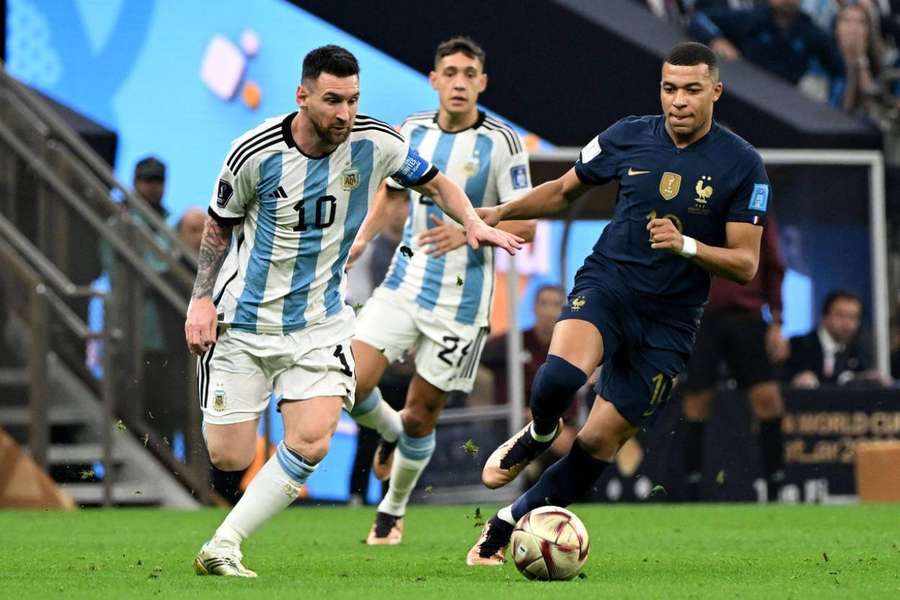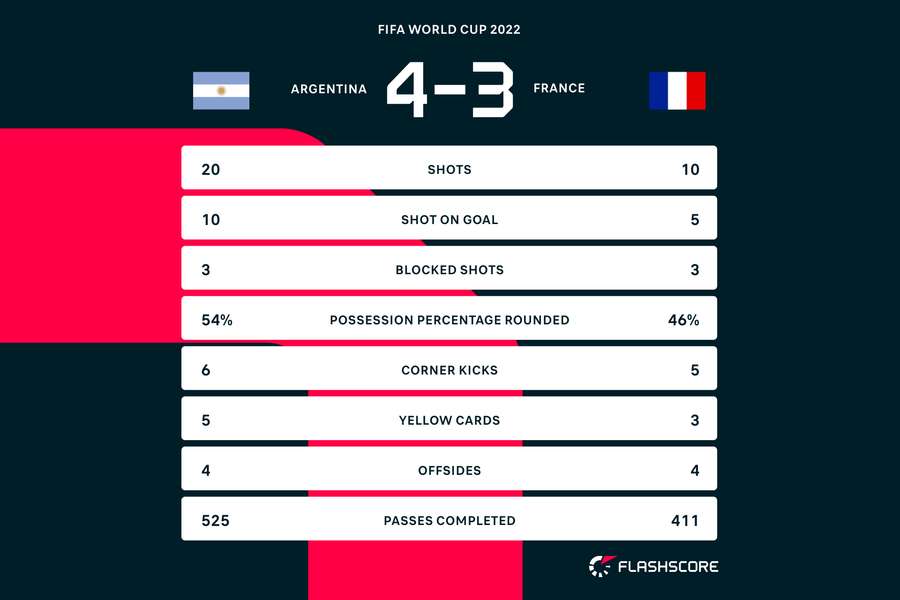40+1 reasons why the World Cup final was one of a kind

It was a gift to see the most unique final in the history of the World Cup. In terms of drama, extraordinary performances by the players and historic milestones. What made the battle for the famous Gold Cup between Argentina and France unique?
Dramatic elements
For the first time, both teams scored at least three goals. And that includes extra time. Until this past Sunday, the loser's maximum was two goals (seven times in total).
Until this match, the team that was still down by two goals in the 80th minute of the championship final has never been able to equalise and force extra time. The most dramatic ending to date was orchestrated by the Germans in 1986, who erased a 0-2 deficit with goals in the 74th and 81st minute. This was also against Argentina. However, they took the lead back after three minutes when Diego Maradona sent in Jorge Burruchaga for the decisive breakthrough.
France are also the first team to score two goals in regular time in a final after the 80th minute.
It was the longest duel for the world throne in history. The referee added another 22 minutes to the 120 minutes, due to the trend of this championship.
Argentina's journey through the tournament lasted 792:09. They thus spent the most time on the pitch of any team in history (until now it was Croatia, who played 778:42 in 2018).
Until Sunday, only two players over the age of 34 had scored in all the final duels together (Sweden's Nils Liedholm in 1958 and France's Zinédine Zidane in 2006). Against France, 35-year-old Lionel Messi (twice more) and Ángel Di María, who will celebrate his 35th birthday in less than two months, were among the scorers.
Kylian Mbappé's goals, which marked France's sudden equaliser, were scored in the space of just 97 seconds. And they were the fastest two consecutive goals in the history of the final. Until then, the record was set by Brazilian Amarildo's reply in 1962, which came about 100 seconds after Josef Masopust's slalom.
It was also the fastest two goals by a single team (until then, approximately 120 seconds separated the 1954 shots by Hungary's Ferenc Puskás and Zoltán Czibor).
Finally, it was also the fastest two goals by a single player (until this year, Geoff Hurst held the title with nine minutes in 1966).
Mbappé also completed the fastest hattrick (38 minutes) in the final, Hurst needed almost triple that (102 minutes) 56 years earlier.
It was the first time both teams had scored in extra time of a final battle.
And also that both finalists had a two-goal scorer, with Frenchman Mbappé even adding a third on top.
At the same time, it has never happened before that club teammates have been among the scorers of rival teams in a final: Messi and Mbappé of PSG. The author of the remaining goal of the game, Di María, was still playing for the same club until July.
It was the final with the highest number of penalties (outside the shootout) in history. The three penalty kicks surpassed the maximum of 1974, when the Germans and the Dutch had one each.

Polish referee Szymon Marciniak became the first referee ever to call a penalty in extra time of a final match.
It was also thanks to Mbappe and co. that for the first time one team had two penalty kicks in the final.
France thus became the first country to have the advantage of a penalty in three different finals. In total, they had it four times, also the most (the second-placed Germans have two). Of Les Bleus' last eight finals, half of their goals have come from penalty kicks.
As for the shootout itself, it was the fifth in the knockout part of the Qatar tournament, an all-time high (there have been four so far in 1990, 2010, 2014 and 2018).
The Argentines have won their sixth shootout in history (they have lost only one), and no other country is more successful in this respect. After Brazil (1994) and Italy (2006), they became the third team to win the title in a penalty shootout.
On the other hand, the French are the first team to lose a second final on penalties. They did the same in 2006 against Italy.
This is the first time since the introduction of the current tournament format in 1986 (i.e. with a play-off from the eighth round onwards) that the world champions have not kept a clean sheet at least twice in the knockout stages. Argentina only withstood Croatia in the semi-finals. A stark contrast to the Spaniards in 2010, who came away with the title after four 1-0 wins.
The French were the first team in the history of the finals not to score in the entire first half and not to have a single touch with the ball in the opponent's penalty area.
The six final goals pulled the number of goals scored in the tournament to 172, an all-time high (171 goals so far in 1998 and 2014).
Lionel Messi
With just one start in the final, he broke the record for most games played at a World Cup. It was his 26th match and he overtook Germany's Lothar Matthäus in the historical table by one game.
With his two goals, he improved his tournament tally to 13 goals and eight assists, and with a total of 21 goal contributions he surpassed Brazil's Pelé by one.
The seven-time Ballon d'Or winner became the first player in history to score in all rounds of a World Cup (i.e. in the group, the round of 16, the quarter-finals, the semi-finals and the final). Except for the round of 16, he scored from a penalty in all phases (in the quarter-finals and semi-finals it was his only shot). Brazil's Ronaldo missed out on that mark with a goal in the 2002 quarter-final against England. Otherwise, he scored in all six of the remaining matches.
Messi is the first in history to win the trophy for the best player at the World Cup, for the second time (2014 and 2022). It has been awarded since 1982.
In the 24th minute of the final, he became the record holder for the most minutes played in championships. He now has 2,314, with Italy's Paolo Maldini second on 2,217.
The clash with France was also his 19th at a World Cup when he led his team as captain. This is another record.
Kylian Mbappé
With the hattrick, he not only became only the second player to score in a second consecutive World Cup final (after Brazil's Vava in 1958 and 1962), but more importantly, with four goals, he became the overall top scorer in the gold medal duel.
His eight goals are the most by an under-24 player at a single World Cup.
The same goes for his eight total goals in the knockout part of the championship (three in 2018, five now).
He is also the youngest ever (23 years and 363 days) to collect 10 goals at a top tournament. Until now, Germany's Gerd Müller (24 years and 226 days) held the title.
Mbappé is not only the first player in the history of the finals to take (and convert) two penalties in one match, but he also met the challenge in the final shootout. And... he sent all three penalty kicks to the same place.
Everything else
Argentina's Ángel Di María became the first player in history to score in the finals of the World Cup (2022), the Copa América (2020) and the Olympics (2008). Moreover, it was the winning goal at the Copa América and the Beijing Games. On top of that, he was among the scorers in last year's new Finalissima duel against Italy between the South American and European champions.
French goalkeeper Hugo Lloris made a record 20th appearance in the battle for gold at the World Cup. After the semi-final, he was sharing the top spot among goalkeepers with Germany's Manuel Neuer.
For the first time ever (and at the eighth try), a player who came on to the pitch just before the end of extra time succeeded in a penalty shootout at a World or European Championship. Argentina's Paulo Dybala managed to break the curse by not faltering in the second series of penalties.
The match became the most watched programme in the history of French television. 24.08 million viewers tuned in live on TF1. The previous high was 22.2 million for the 2006 World Cup semi-final between France and Portugal.
The final was a huge hit for the Internet giant Google. The company's executives revealed that the final has become the most searched term since the platform launched in 1998. "It's like the whole world is searching for one thing," said the company's CEO.
A photo of Messi with the World Cup trophy received the most likes in Instagram history. More than 60 million people have liked it on the social network. In fact, four of Messi's posts are in the top 10 and all of them are related to the just-concluded tournament.
And the bonus of a quite extraordinary final? Messi has fulfilled the wishes of most of the globe, capping his breathtaking career with a last-minute world championship triumph and ascending to football's Olympus to complete the holy trinity alongside Pele and Maradona.

